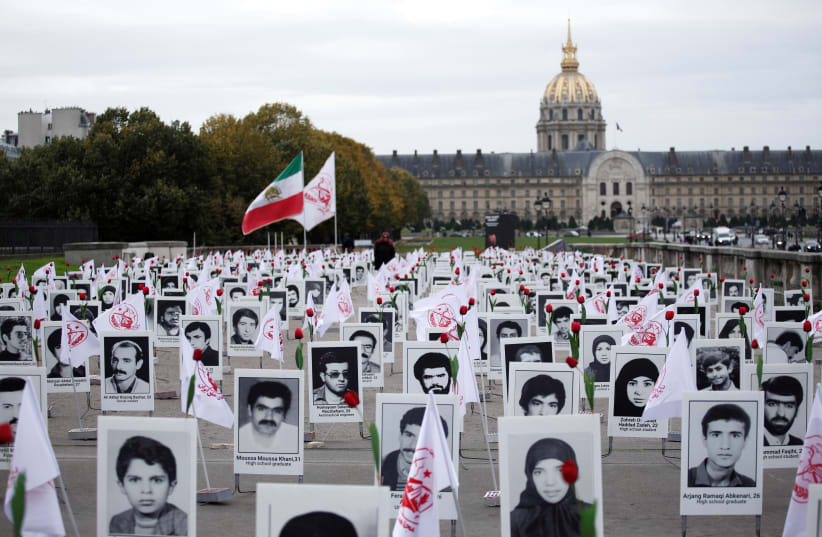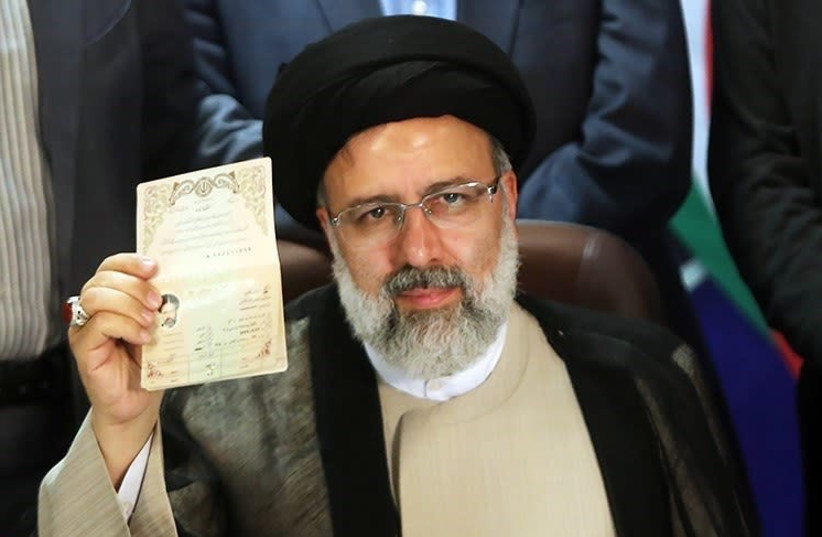British-Australian academic Kylie Moore-Gilbert is imbued with scholarly brilliance, energy and a burning desire to fight. The fire in her belly helped her survive the Iranian regime’s penal colony, where she was held hostage for more than two years – 804 days – between 2018 and 2020. Her book The Uncaged Sky: My 804 days in an Iranian prison joins the pantheon of profoundly important books chronicling the crimes of totalitarian regimes.
For those who follow Moore-Gilbert on Twitter (and I recommend that Middle East observers follow her), she writes and works tirelessly to secure the release of Iranian political prisoners and foreigners used as hostages who are tossed into the vast prison system of the Islamic Republic of Iran.
In September, she joined a high group of Iranian dissidents and former Western hostages to file a federal civil lawsuit in New York City against the president of the Islamic Republic, Ebrahim Raisi.
The plaintiffs allege violations of the Torture Victim Protection Act. “Iranian President Raisi was the head of judiciary during my sham trial and bogus conviction for ‘espionage’ in a Revolutionary Court in 2019,” Moore-Gilbert tweeted. “[I] and other victims are suing him in New York under the Torture Victim Protection Act.”
Raisi, who has earned the pejorative moniker “Butcher of Tehran” because of the mass murders he allegedly carried out, is slated to speak at the UN in September. The Trump administration sanctioned him for his role in the massacre of 5,000 Iranian political prisoners in 1988, as well as his complicity in the slaughter of 1,500 Iranian protesters in 2019.
Back to Moore-Gilbert’s imprisonment and torture. I strongly suspect her book will pique the interest of many Israeli readers and Jews in the Diaspora. I hope her book swiftly finds a Hebrew publisher, for it is riveting non-fiction that conjures up the works of the legendary spymaster author John le Carré and the spellbinding interactions among governments and intelligence services. “Spellbinding” is an overused work in the world of book reviews, but it authentically applies to Moore-Gilbert’s work.
She delves into the psyche of the wild conspiracy theories that occupy the minds of the ruthless men who wield power in the theocratic state.
Why did the Iranian regime arrest Kylie Moore-Gilbert?
IRAN’S REGIME framed Moore-Gilbert as an espionage agent working for the State of Israel. Her ex-husband has Israeli citizenship. She notes that “Despite their interest in my husband and his connection to Israel, it was clear that the reason for my arrest was my research into the Shi’a community in Bahrain and its ties with Iran.
“The men performed all sorts of rhetorical acrobatics to try to link these two subjects, and thereby craft a narrative explaining why somebody allegedly spying for Israel would be interested in religious and cultural links between Bahrain and Iran.”
Kylie Moore-Gilbert
“The men performed all sorts of rhetorical acrobatics to try to link these two subjects, and thereby craft a narrative explaining why somebody allegedly spying for Israel would be interested in religious and cultural links between Bahrain and Iran,” she wrote.
“However, they were never able to properly make sense of this, nor find any convincing reason as to why Israeli intelligence would be interested in such a niche subject to the extent that they would send a random Australian academic on a highly dangerous ‘mission’ to Iran to gather information,” Moore-Gilbert wrote.
“The fact that they couldn’t explain it did not exonerate me in their eyes, however. The weak points in the men’s logic were often substituted with long ideological rants about ‘normalization’ between Israel and the Arab Gulf states, and broad sweeping statements about the coming destruction of the ‘Zionist regime.’”
Her book is packed full of anecdotes along these lines.
She writes about spending significant time watching the infamous Press TV because it is the only English-language TV show. The outlet is “a state-run news outfit targeting international viewers sympathetic to Iranian interests. The content was heavily propagandistic and most of the presenters of the channel’s news and current affairs programming did not even bother to appear impartial and unbiased. Conspiracy theories were heavily promoted and the West was blamed for any and every misfortune which befell Iran and its allies.”
In 2009 during the Green Movement protests against the fraudulent presidential election of Mahmoud Ahmadinejad, Press TV played a role in the torture of the then-Newsweek journalist Mazir Bahari.
Moore-Gilbert’s interaction with Ruqaya Haji is utterly fascinating and highly disturbing. “Ruqaya was the only genuine spy any of us would ever hear of that the Revolutionary Guards had actually caught,” says the author.
Haji is from Bahrain and was arrested in Mashhad for surveiling “Bahraini opposition figures on behalf of the regime in Bahrain.”
Moore-Gilbert reports that Haji confessed straight away and that “the [Islamic] Revolutionary Guards [Corps – IRGC] had made her an offer: if Ruqaya agreed to ‘flip’ and spy for them instead, they would send her back to Bahrain. Otherwise, they would convict her and she would have to serve out the entirety of her sentence in Evin,” a notorious prison in Tehran accused of committing serious human rights abuses.
“Because Iran and Bahrain did not have diplomatic relations, and Bahrain cared little about its Shi’a citizens, there was no prospect of a prisoner swap or diplomatic deal,” the book says.
“Ruqaya immediately agreed. In the end, the Revolutionary Guards convicted her anyway, and used the ten-year sentence she had received as leverage over her while she remained in Evin prison.”
The IRGC activated Haji to spy on Moore-Gilbert. “Ruqaya often attempted to get me to talk about my case. She would make poorly disguised comments designed to dig for information about my views on spying for different intelligence agencies, whether I encountered the mukhabarat security police during my research trip to Bahrain and whether I’d consider working as a spy once I was released from prison,” she wrote.
“She also sang the praises of Israel, saying that she supported the Jewish state in its conflict with the Palestinians and that she dreamed of visiting Tel Aviv one day,” Moore-Gilbert wrote. “Such pronouncements were highly suspicious, given that in every other regard her worldview seemed to match that of the Revolutionary Guards. I was actually offended that she thought I would be fooled by this, and remained tight-lipped about my views on Israel.”
Additional sections of the book provide keen insights into how the IRGC wanted to spy on Israel.
Moore-Gilbert’s book is a serious and powerful contribution to understanding the clerical regime’s opaque prison and judicial systems. It shines an important light on how Iran’s regime uses hostage-taking of foreigners to secure concessions from the West and other non-Western countries. Her book is, in short, a must read for anyone interested in this disturbing and tragic issue.
The Uncaged SkyBy Kylie Moore-GilbertUltimo Press416 pages; $26.47

